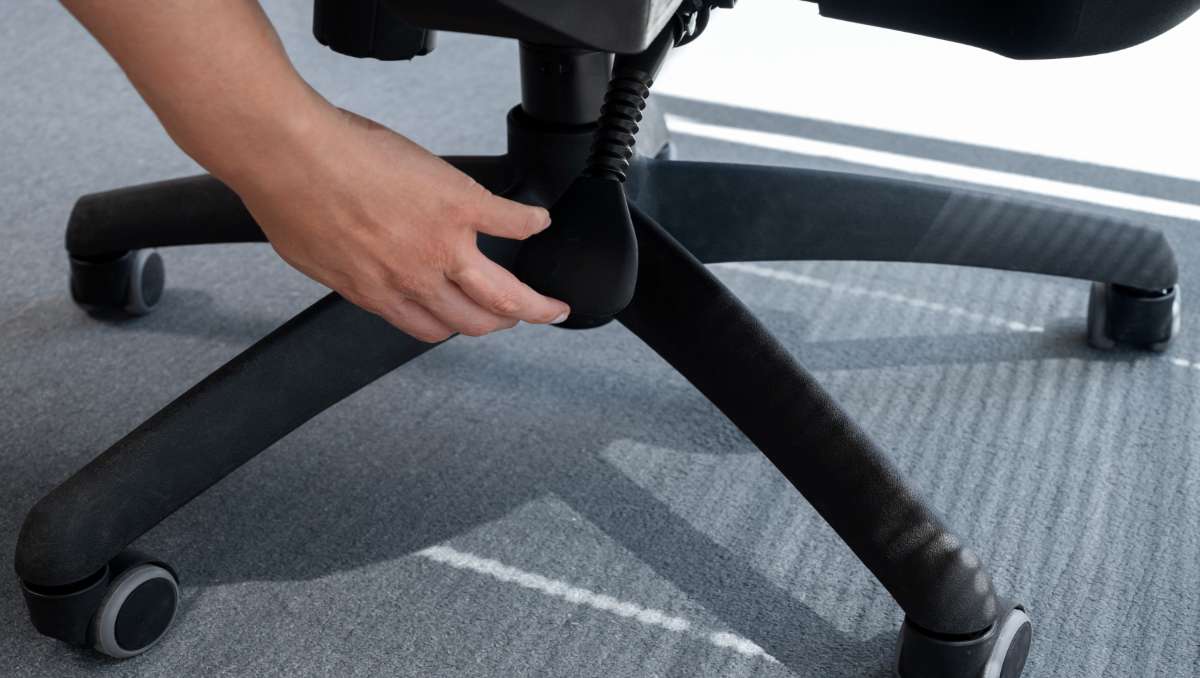If you’ve ever rolled your desk chair across the floor and felt that dreaded clunk, scratch, or resistance, you’re not alone. Most of us don’t give our chair wheels a second thought—until they start ruining our floors or making it feel like we’re dragging an anchor every time we move. Whether you’re working from a sleek home office with pristine hardwood or a cozy corner with plush carpet, the right wheels for desk chairs can make a surprising difference in both comfort and floor protection.
Key Takeaways:
- Understanding how wheels are made helps you pick ones that fit and work well.
- Soft wheels like rubber or polyurethane are best for hardwood. Hard plastic works better on carpet.
- Some wheels roll smoother or protect floors better, depending on the surface.
In this guide, we’ll break down the best wheels for desk chairs, tailored specifically for hardwood and carpeted floors, so you can roll smoothly, work efficiently, and keep your floors looking great.
The Anatomy of Wheels for Desk Chairs: What You Should Know
Desk chair wheels, or casters, might seem like a small detail, but they have a big impact on how easily your chair moves and how your floors hold up over time. For hardwood floors, the best options are soft, non-abrasive wheels—rubber or softer nylon work well to prevent scratches and reduce noise. On carpeted floors, harder wheels like metal or tough nylon are better suited to handle the extra friction. The wheel material isn’t the only thing that matters—ball bearings inside the wheels allow for smoother rolling, while sleeve bearings are more basic and create more drag. Also, make sure the stem (the part that connects the wheel to the chair) matches your chair’s size, especially if you’re replacing old wheels.
Here’s a comparison table for the types of chair casters, tailored to their performance across different floor types:
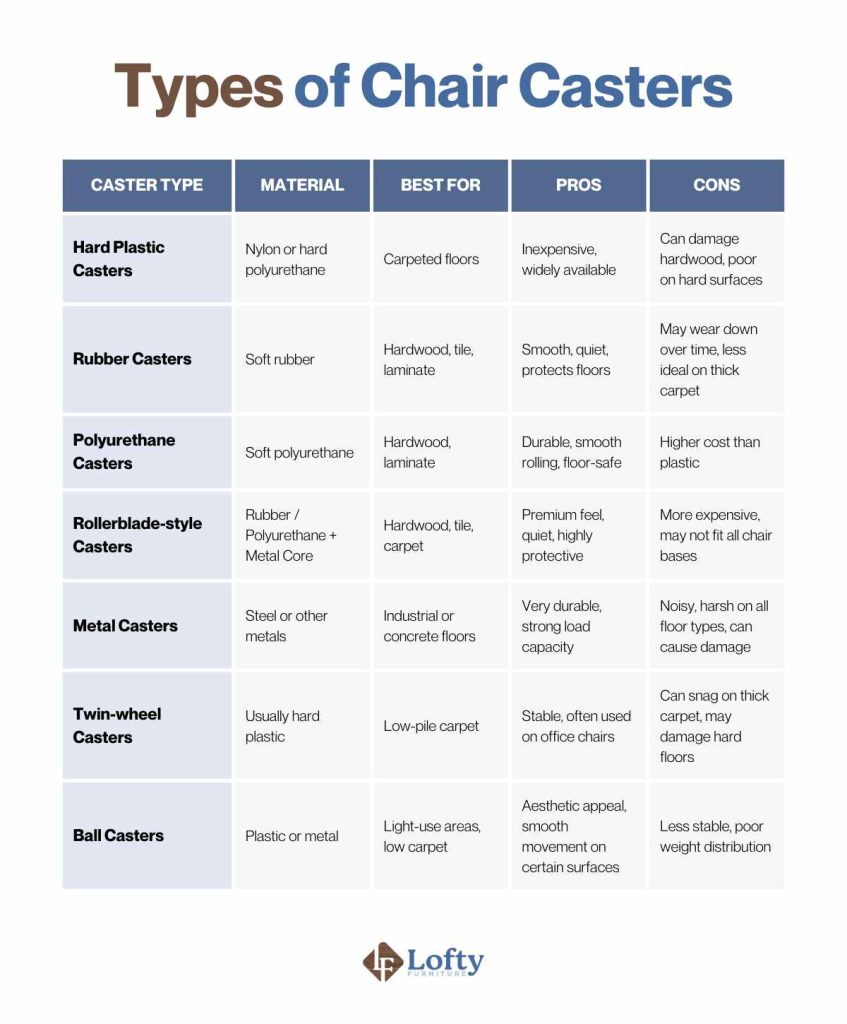
The Best Types of Desk Chair Wheels for Hardwood Floors
When it comes to hardwood floors, the top priorities for desk chair wheels are preventing those dreaded scratches and ensuring a smooth, quiet glide across the delicate surface. The wrong wheels can quickly turn your beautiful floors into a landscape of unsightly marks and create unnecessary noise as you move. Thankfully, there are specific types of wheels designed with these concerns in mind, focusing on materials that are gentle yet durable.
Polyurethane (PU)
Polyurethane is often hailed as an excellent choice for hardwood floors due to its unique soft, rubber-like properties. This material offers a fantastic balance of grip and give, allowing the wheel to roll smoothly without digging into or marking the wood. You’ll find various types of polyurethane wheels, including softer formulations for maximum floor protection and dual-wheel designs that can offer enhanced stability and weight distribution.
Soft Rubber
Another great option for safeguarding hardwood floors is soft rubber. These wheels provide a cushioning effect as you move, further minimizing the risk of scratches or dents. Their quiet operation is a significant advantage, allowing you to shift around without disturbing others. Different types of soft rubber wheels exist, varying in thickness and durometer (hardness), allowing you to choose a level of softness that best suits your needs and the sensitivity of your hardwood flooring.
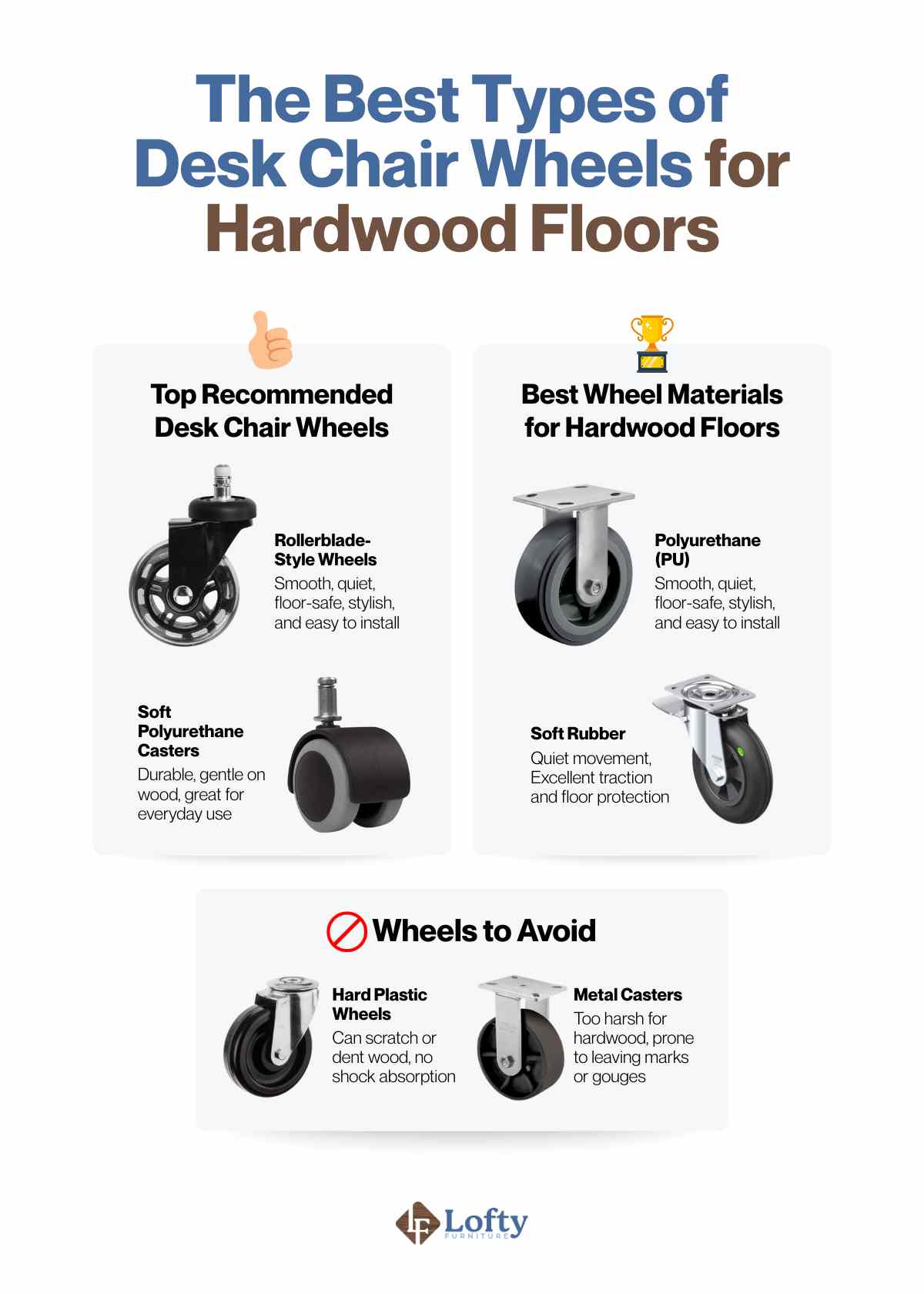
Learn about the difference between a hardwood vs. softwood.
The Best Types of Desk Chair Wheels for Carpeted Floors
Moving a desk chair across a carpeted floor presents a different set of challenges compared to hardwood. The primary hurdle is overcoming the friction created by the carpet fibers, which can often cause standard wheels to get bogged down or stuck. To navigate this effectively, the best wheels for desk chairs for carpeted surfaces are typically designed with a focus on rigidity and the ability to roll over, rather than grip, the fibers.
Nylon/Hard Plastic
Wheels made from nylon or other hard plastics are often recommended for carpeted floors due to their rigid nature. This firmness allows the wheels to cut through and roll over carpet fibers more easily. This also reduces drag and making movement less strenuous. You’ll find these types of casters in both single-wheel and dual-wheel designs.
Carpet Casters with Specific Designs
Beyond standard hard plastic casters, there are also specialized carpet casters designed with unique features to enhance mobility. These might include a wider tread, which provides a larger surface area to roll over the carpet, or distinct tread patterns engineered to grip and release carpet fibers more effectively. Some designs might even incorporate a larger wheel diameter to help bridge the gaps between carpet fibers and reduce sinking.
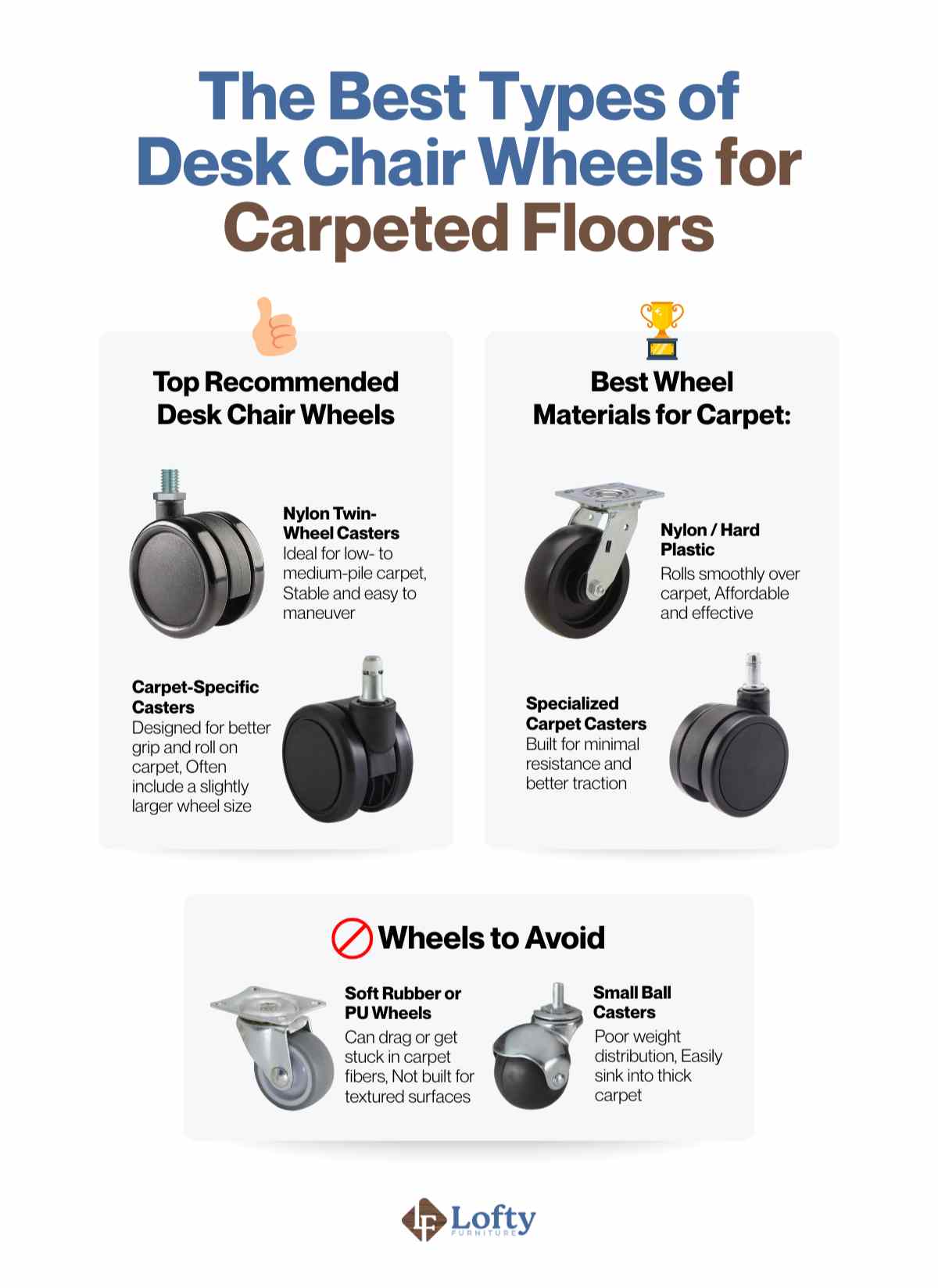
Other Key Factors to Think About (Beyond Just Your Floor Type)
While your floor type definitely plays a big role in choosing the right chair wheels, there are a few other important things to keep in mind.
Chair Weight and Load Capacity
Weight capacity is a good place to start. Your wheels need to support not just your chair, but also your body weight. If the casters aren’t rated to handle that load, they can wear out quickly, break, or just stop rolling properly. Always check the manufacturer’s specs to make sure the wheels you’re looking at can handle the total weight.
Wheel Size and Maneuverability
Wheel size is another factor that can make a noticeable difference. Larger wheels tend to roll more smoothly—especially over rugs, cords, or uneven surfaces. They can also help your chair move a little faster. Smaller wheels, on the other hand, are a bit better for maneuvering in tight spaces. Think about how much room you have to move and what kind of surfaces you’re usually rolling over.
Noise Levels
If a quiet workspace matters to you, pay attention to both the wheel material and the bearings. Softer materials like polyurethane, along with smooth-rolling ball bearings, usually keep noise to a minimum. Harder plastic wheels or cheaper bearings can be a lot noisier, especially on hard floors.
Tired of noisy, hard-to-roll office chairs? Find out why roller blade wheels can transform your workspace comfort and mobility.
Ease of Installation
You’ll also want to consider how easy the wheels are to install. Most office chairs use a grip ring stem, which just pops into place—super simple, no tools required. But some chairs use threaded stems, which screw in and may need a wrench or a bit more effort. It’s worth checking which type your chair uses before you buy.
Durability and Longevity
Higher-quality materials like polyurethane or rubber, paired with good bearings, usually last much longer than basic plastic wheels with sleeve bearings. Spending a little more upfront on well-made wheels can save you from replacing them again in a few months.
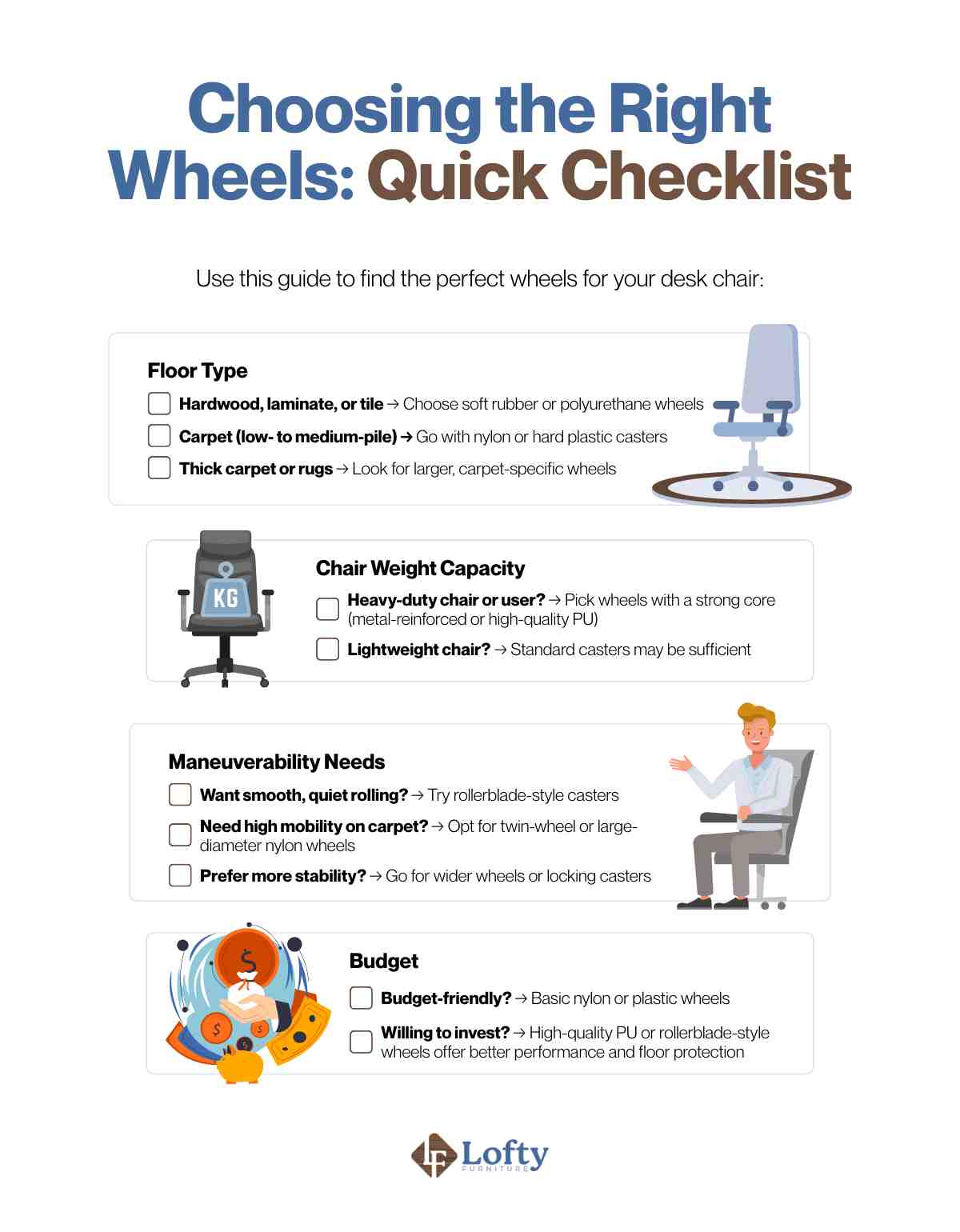
Looking to upgrade your desk chair’s mobility? Consider the comfort and support of a Midland desk arm chair – a perfect complement for an enhanced workspace experience.
Making the Right Choice for Your Floors and Comfort
Ultimately, selecting the ideal desk chair wheels boils down to understanding your primary needs and the type of flooring in your workspace. Whether you prioritize protecting your delicate hardwood or require smooth mobility across a thick carpet, the market offers a variety of options designed to enhance your comfort and preserve your floors. Consider the material, size, and other factors discussed to make an informed decision that will lead to a more enjoyable and efficient work environment.
FAQs
How can I determine what type of stem my current wheels for desk chairs have?
To determine your current wheel stem type, first try pulling a wheel straight out. If it comes out with a snap and you see a ring at the top, it’s likely a grip ring stem. If the wheel unscrews when you rotate it, it’s a threaded stem.
Are rollerblade-style wheels a good option for both hardwood and carpet?
Rollerblade-style wheels with a polyurethane outer layer can be a decent middle ground for both hardwood and low to medium-pile carpets. They offer some floor protection and improved rolling compared to standard hard plastic.
How do I know when it’s time to replace the wheels on my desk chair?
You should replace your desk chair wheels if you experience difficulty rolling, notice squeaking or grinding noises. Also, check for visible damage like cracks or chips, marking or scratching your floors, or if the office chair movement feels wobbly or uneven.
